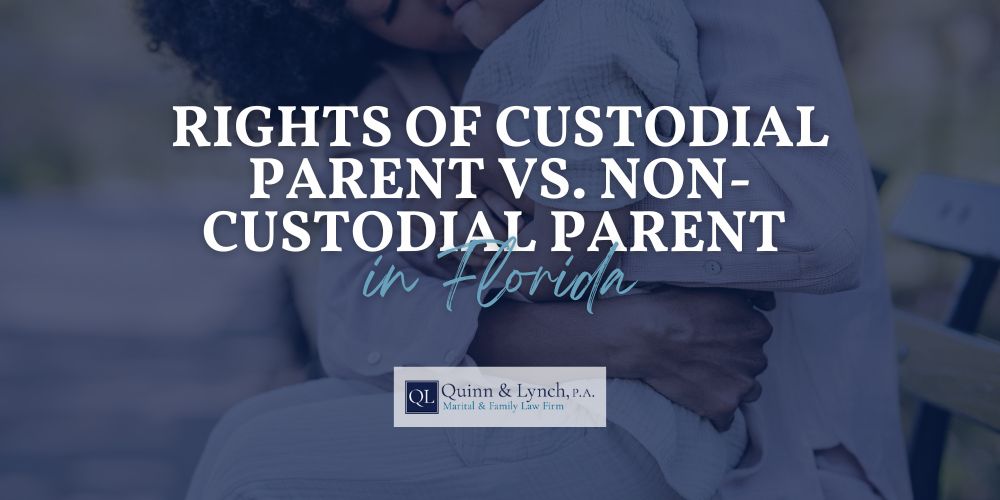Understanding the rights of custodial parent vs. non-custodial parent in Florida can feel overwhelming when you are already dealing with the stress of separation or divorce. At Quinn & Lynch, P.A., we help parents in Tampa and throughout Florida understand how custodial rights, legal custody, physical custody, and parenting time work under Florida law.
Whether you are a custodial parent with primary physical custody or a non-custodial parent seeking fair visitation rights and involvement in your child’s upbringing, our goal is to protect your parental rights and your child’s best interests. We guide separated parents through the process of creating custody agreements, court orders, and parenting plans, ensuring you understand your rights and responsibilities.
If you need answers about your role in your child’s life and want legal guidance from our Tampa child custody lawyers, call us today at (813) 223-7739 or reach out through our online contact page to get started.
What Is a Custodial Parent in Florida?
In Florida, the court-approved parenting plan generally gives the custodial parent more parenting time and establishes the child’s primary residence with that parent. This parent often has primary physical custody and may also share or hold sole legal custody depending on the court orders. The custodial parent is typically responsible for making major decisions affecting the child’s upbringing, including the child’s education, health care, and religious upbringing, unless the parents have joint legal custody.
Custodial Rights: What Legal Rights Does the Custodial Parent Have?

In Florida, a custodial parent has specific rights and responsibilities that directly affect the child’s life. The court-approved custody order or parenting plan often outlines these rights. They can involve decision-making authority, time-sharing rights, and the right to receive child support payments from the non-custodial parent. Understanding these rights helps the custodial parent protect their child’s best interests and maintain a stable, supportive home environment.
Decision-Making Authority
Florida law separates decision-making into parental responsibility. When parents share legal custody, they must jointly decide on the child’s education, health care, and religious upbringing. If one parent has sole parental responsibility, they have full authority but must keep the non-custodial parent informed. Whether shared or sole, decision-making must reflect the child’s best interests and support their overall well-being.
Time-Sharing Rights
Time-sharing defines where the child lives and how parenting time is divided. The custodial parent typically has primary physical custody, meaning the child spends most overnights at home. A court-approved parenting plan outlines the visitation schedule and helps maintain a consistent routine. Even when one parent has majority time-sharing, the other parent retains visitation rights and plays an active role in the child’s life.
Receiving Child Support Payments
The custodial parent may be entitled to receive child support payments from the non-custodial parent to help cover the costs of the child’s care, including housing, food, clothing, and other needs. Our Tampa child support lawyers at Quinn & Lynch, P.A. can help parents understand their rights to financial support and work to ensure the court order reflects the child’s needs and the parent’s income.
What Is a Non-Custodial Parent in Florida?
A noncustodial parent is the parent with minority time-sharing, meaning the child lives with them less than half of the time. Depending on the custody agreement, this parent may still share legal custody and have significant parenting time.
Being a noncustodial parent does not mean losing parental rights. Florida courts recognize the importance of both parents staying involved in the child’s life and making decisions that reflect the child’s best interests.
Non-Custodial Parent Rights Under a Florida Custody Order
A Florida custody agreement outlines the rights and responsibilities of both parents, including those with minority time-sharing. Non-custodial parents still play an important role in the child’s care, and the court may impose legal consequences if they do not follow court orders.
Visitation and Time-Sharing
Under a Florida custody order, the court-approved parenting plan entitles the non-custodial parent to visitation rights. This time-sharing schedule outlines when the child spends time with each parent, helping to provide a consistent routine. The non-custodial parent can request court enforcement if the other parent denies scheduled visits. These court orders protect the parents’ rights and the child’s well-being.
Input in Major Decisions
Even when one parent has majority time-sharing, the non-custodial parent retains important legal rights. If the parents share legal custody, both have equal input in major decisions, such as where the child attends school, medical care, and religious upbringing.
Although the non-custodial parent may not have complete control, they must be kept informed and granted access to school and medical records. Shared decision-making supports the child’s well-being and ongoing parental involvement.
Obligation to Pay Child Support
The non-custodial parent has a legal duty to provide financial support for their child. Florida’s child support guidelines use a formula that considers each parent’s income, time-sharing schedule, and the child’s needs. These payments help cover basic expenses like housing, food, education, and health care. When a parent fails to pay child support, the court may issue enforcement actions to protect the child’s well-being and financial stability.
Shared Parental Rights Regardless of Custody Status
Custody status does not remove a parent’s legal custody rights. Both the custodial and non-custodial parents have the right to access school and medical records, communicate with the child, and participate in significant decisions affecting the child’s upbringing and life. Court orders protect these rights and responsibilities, and the court can enforce them if the other parent refuses to comply.
As experienced Tampa divorce attorneys, we help clients address these violations and restore proper communication and boundaries.
Protecting the Child’s Well-Being During Custody Disputes
Custody disputes can disrupt the child’s routine and emotional well-being, especially when parents struggle to agree on time-sharing, school decisions, or financial support. Common issues include denied visitation, failure to follow the parenting plan, or disagreements over medical care. Mediation is often the first step in resolving these problems, but court intervention may be needed if one parent refuses to cooperate.
Tampa family law attorneys at Quinn & Lynch help parents take action to preserve the child’s mental health and well-being and enforce existing court orders.
Modifying Custody or Time-Sharing Agreements in Florida
Florida law allows parents to request modifications to existing court orders when a substantial change in circumstances occurs. This could include changes in employment, relocation, a shift in the child’s needs, or the other parent’s conduct.
Our Tampa modifications attorneys guide parents through the legal process, filing petitions and presenting evidence to support a change in custody or time-sharing.
How Florida Courts Prioritize the Child’s Best Interests

Florida courts review several factors to decide what custody arrangement serves the child’s best interests. These factors include the child’s age, the quality of the child’s relationship with each parent, and the safety and stability of each home. Judges also look at each parent’s ability to provide a safe and nurturing environment, meet the child’s evolving needs, and offer consistent emotional support. Courts determine custody based on what promotes the child’s well-being, not either parent’s preferences.
Common Disputes Between Custodial and Non-Custodial Parents
Tension often arises when custodial and non-custodial parents disagree on important matters. Common disputes include missed visitation or interference with time-sharing, relocating without proper notice, disagreements over the child’s education or health care, and refusal to pay child support.
At Quinn & Lynch, P.A., we represent parents dealing with these challenges by working to enforce custody orders and protect their parental rights. Our Tampa child support enforcement attorneys can take action when a parent fails to meet their financial responsibilities.
How Tampa Child Custody Lawyers Can Help With Custody Arrangements
Separated parents benefit from clear custody arrangements that define each parent’s rights and responsibilities. At Quinn & Lynch, our Tampa child custody lawyers help create parenting plans that are fair, enforceable, and focused on the child’s well-being. We also assist with modifying time-sharing schedules, resolving disputes between custodial and non-custodial parents, and representing clients in contested cases.
If you’re dealing with relocation or need help creating a long-distance parenting plan in Florida, our team is ready to advocate for your custodial rights and protect your role in your child’s life.
Frequently Asked Questions About Parental Rights in Florida
Who is the Custodial Parent in 50/50 Custody?
When both parents have equal time-sharing, the court does not designate either as the custodial parent. Instead, both share legal and physical custody, and the child’s primary residence may alternate or be assigned for mailing and school purposes only.
When Can You Deny Visitation to the Non-Custodial Parent?
You cannot deny court-ordered visitation without a legal basis. If the non-custodial parent is putting the child’s well-being at risk or violating orders, speak with an attorney to file a motion to modify or suspend time-sharing.
Can Child Support Be Reduced if Custodial Parent Makes More Money?
Child support is determined by both parents’ income, the time-sharing arrangement, and the child’s needs. A higher income by the custodial parent alone does not automatically reduce support. The court reviews multiple factors to determine what’s fair.
Can Non-Custodial Parent Claim Child on Taxes?
Only one parent, usually the custodial parent, can claim the child on tax returns. Parents may sometimes agree to alternate years or designate the non-custodial parent, but this arrangement must be clearly outlined in the parenting plan or a court order.
Unsure About Your Parental Rights? Let the Tampa Child Custody Attorneys at Quinn & Lynch Help.

Sorting out the rights of custodial parent vs. non-custodial parent in Florida can be challenging. Every decision, from legal custody to time-sharing and child support, directly affects your child’s daily routine and long-term well-being.
At Quinn & Lynch, P.A., our Tampa child custody lawyers represent parents in custody matters, including the development of parenting plans, modification requests, and disputes involving visitation or decision-making authority. We work with separated parents to develop solutions that support the child’s care, establish structure, and meet the legal requirements under Florida law.
Our law firm is committed to helping you take the next step with confidence. Whether you are starting from the beginning or need help enforcing an existing order, we are ready to assist. Call (813) 223-7739 or contact us online to schedule your consultation with a Tampa child custody attorney today.













